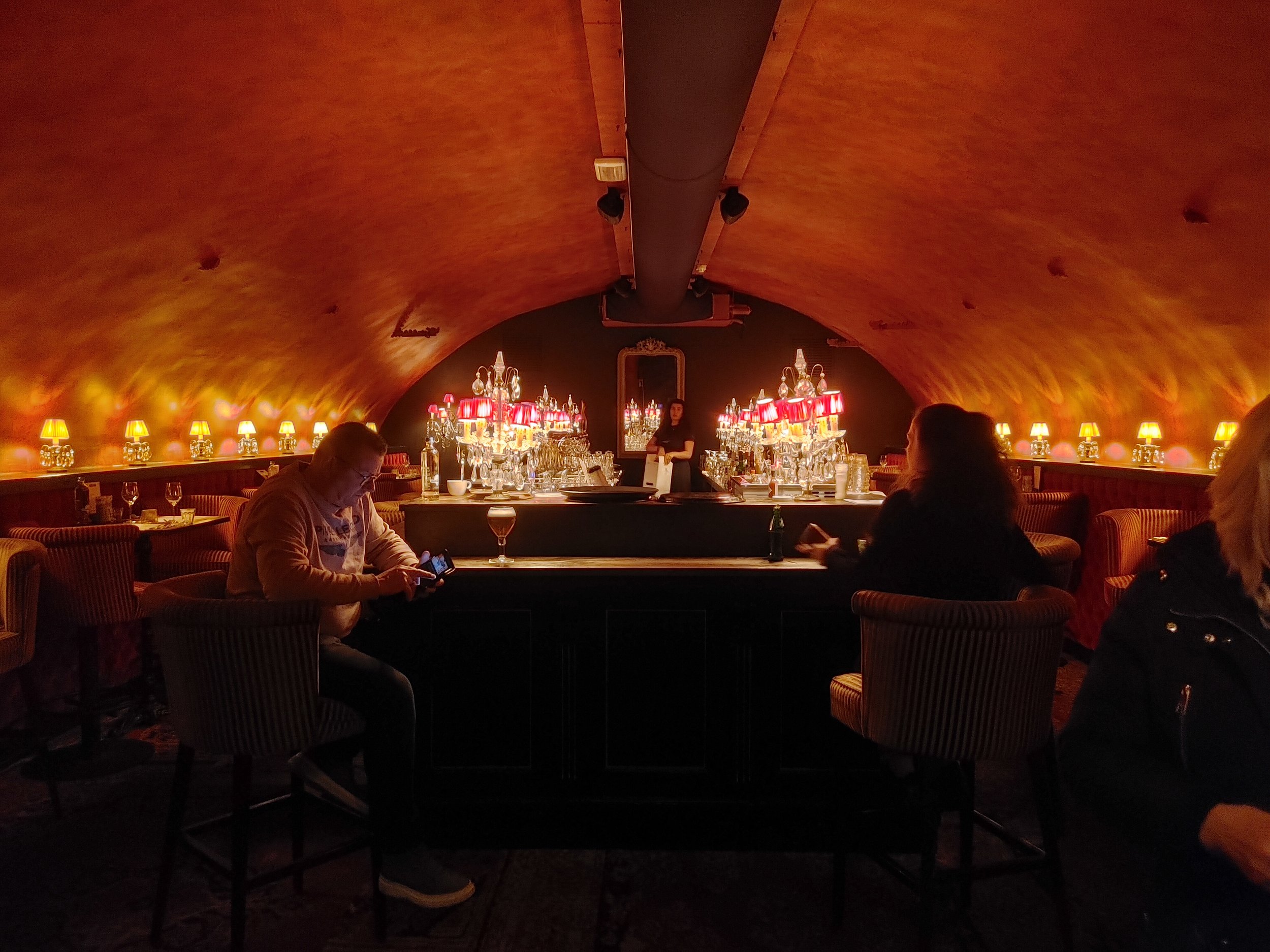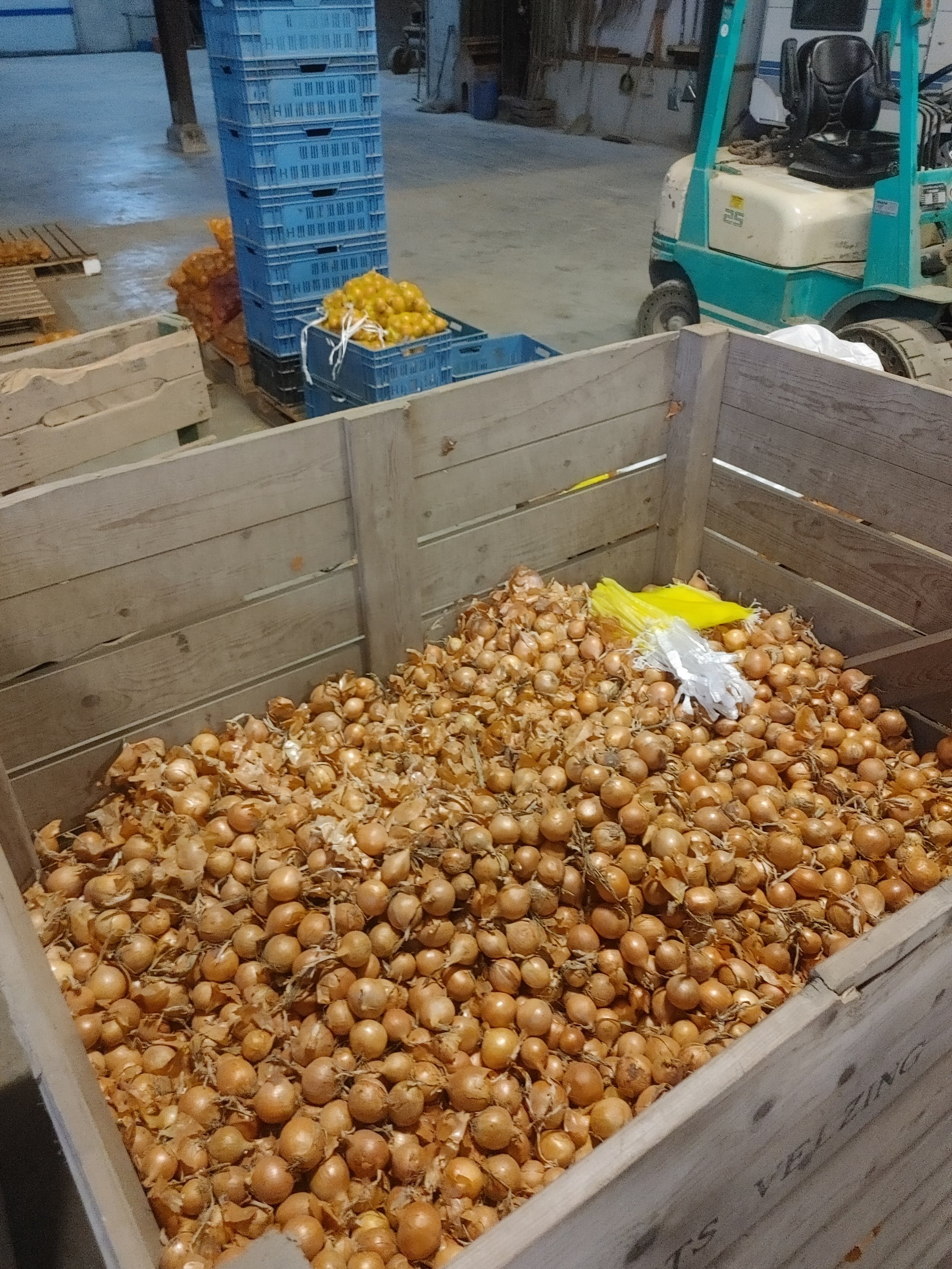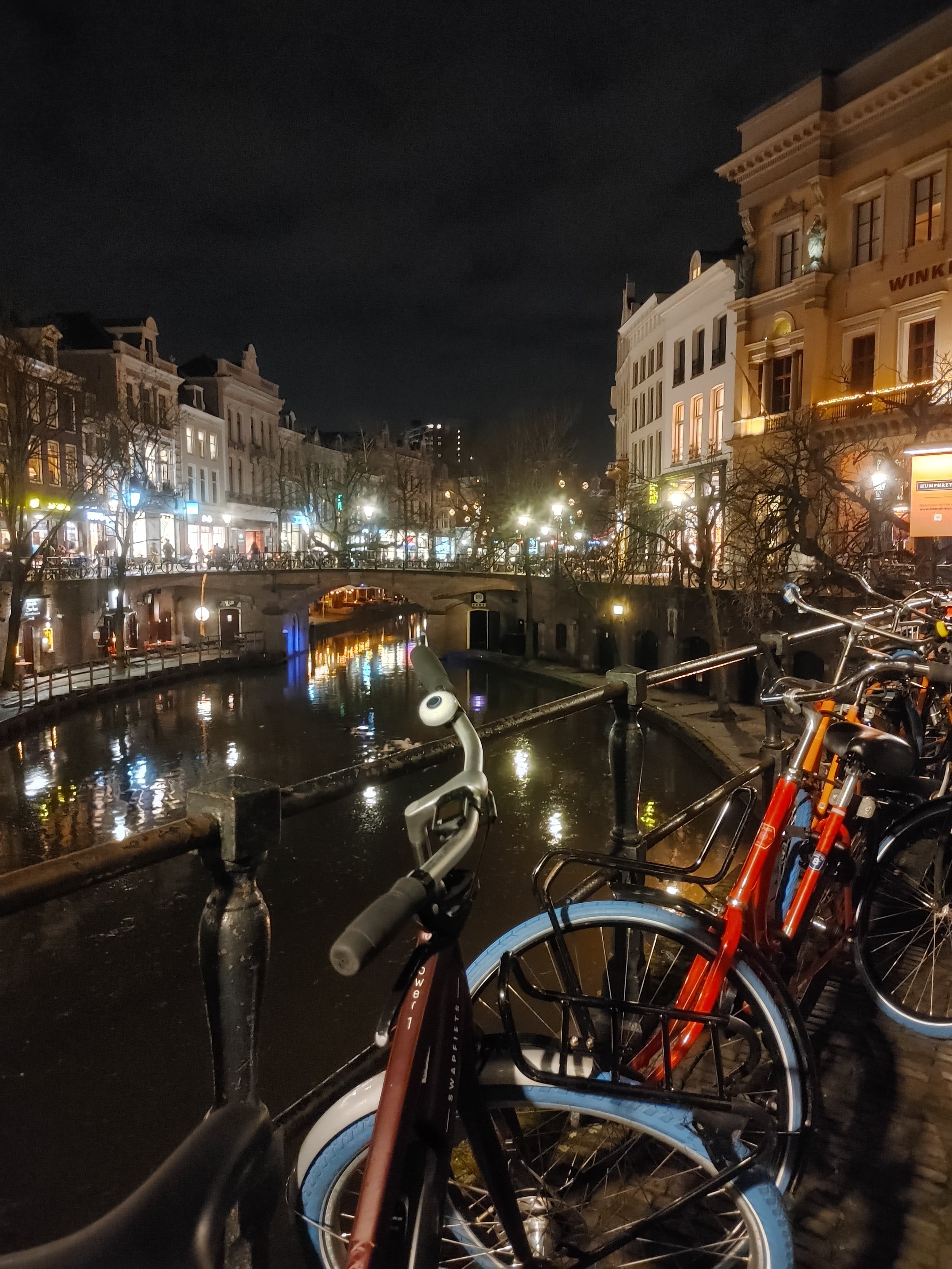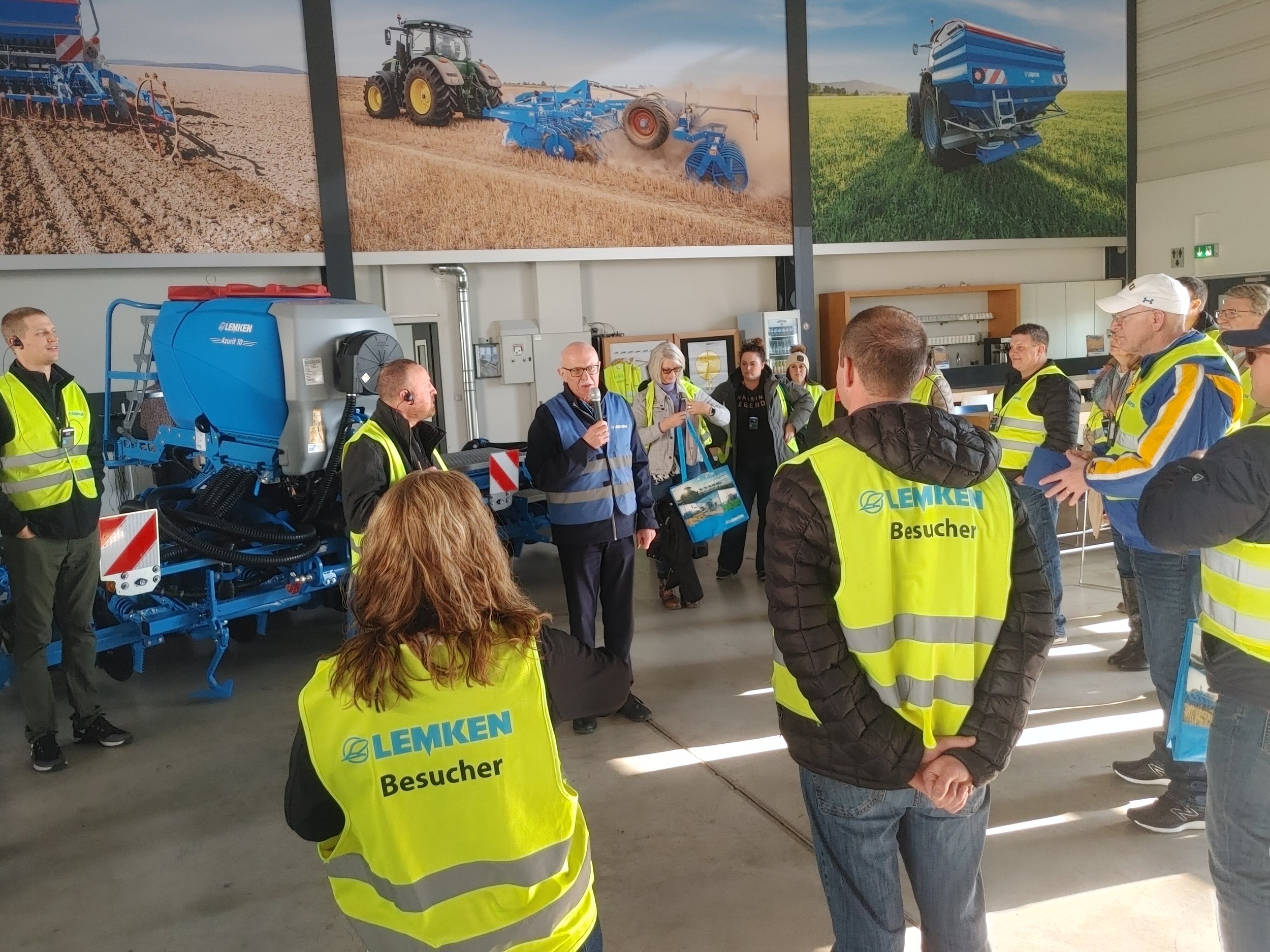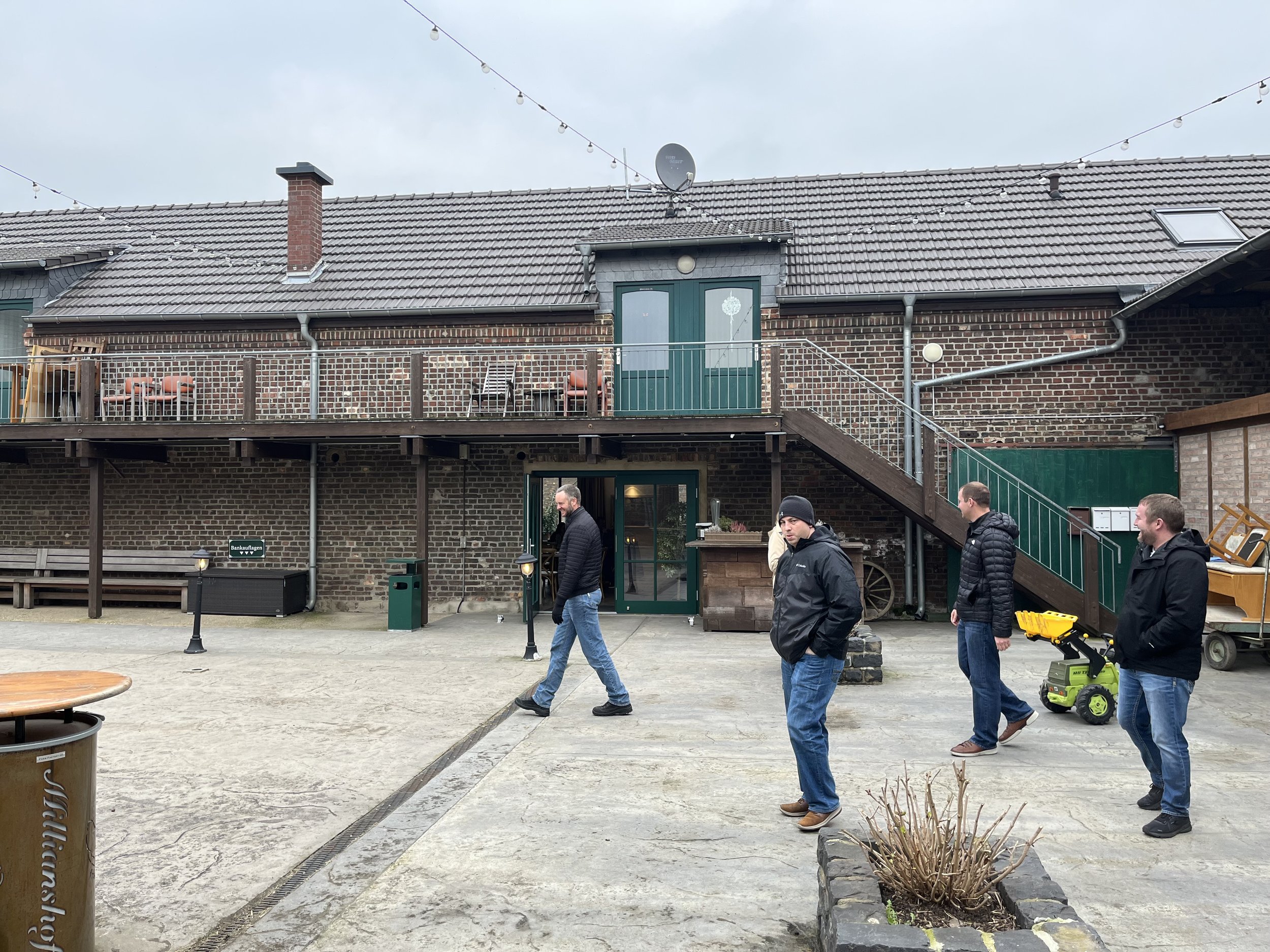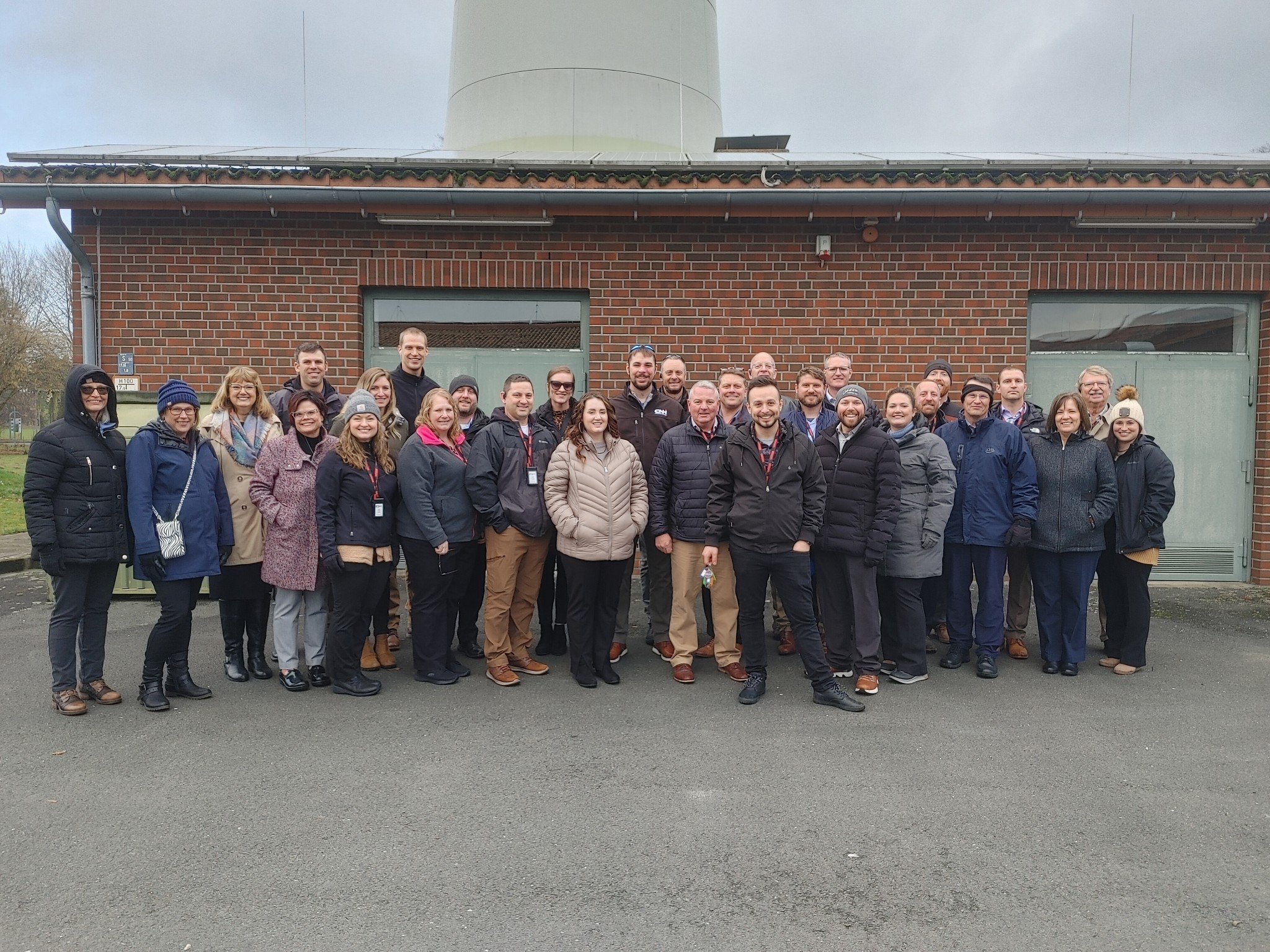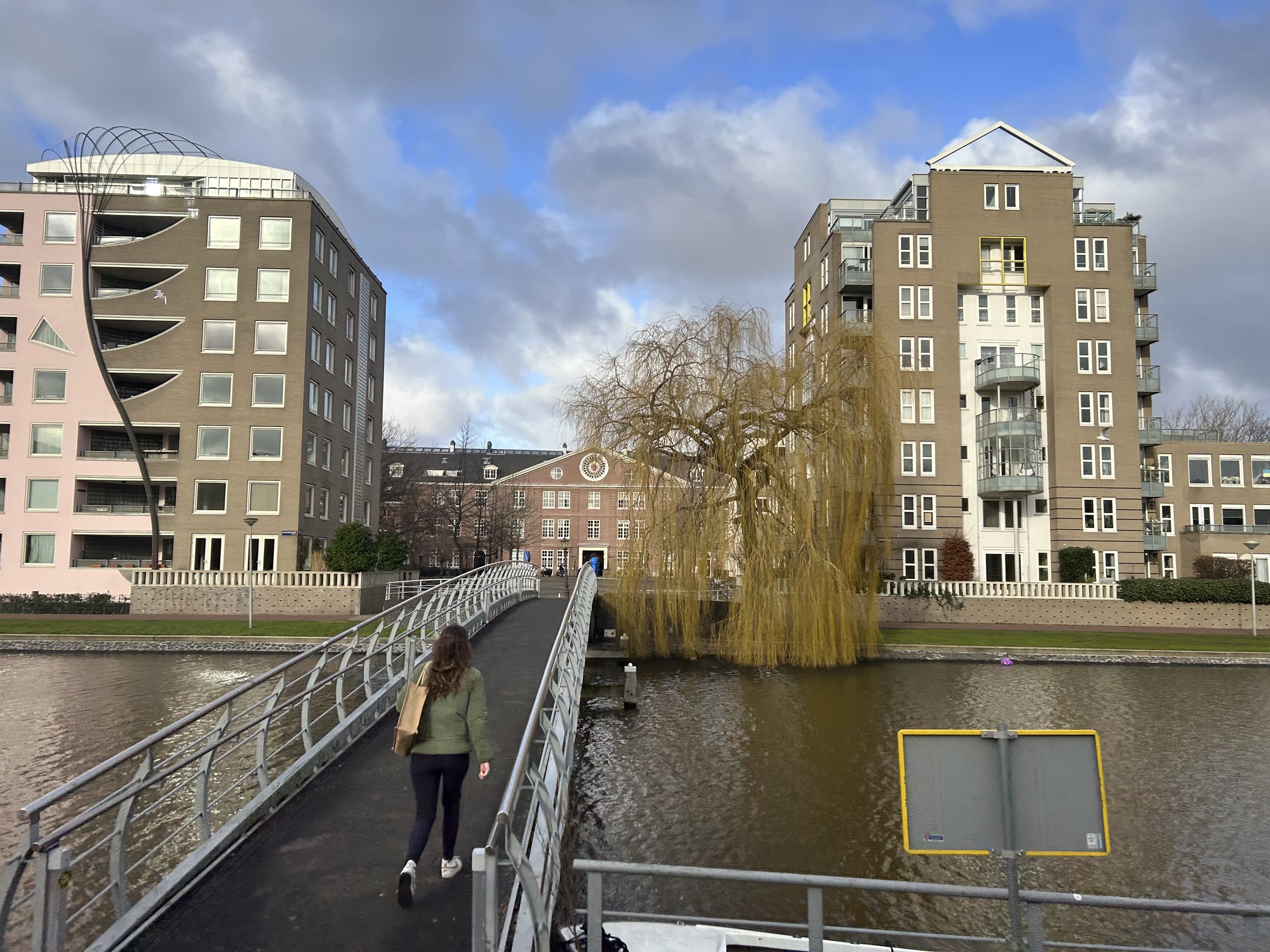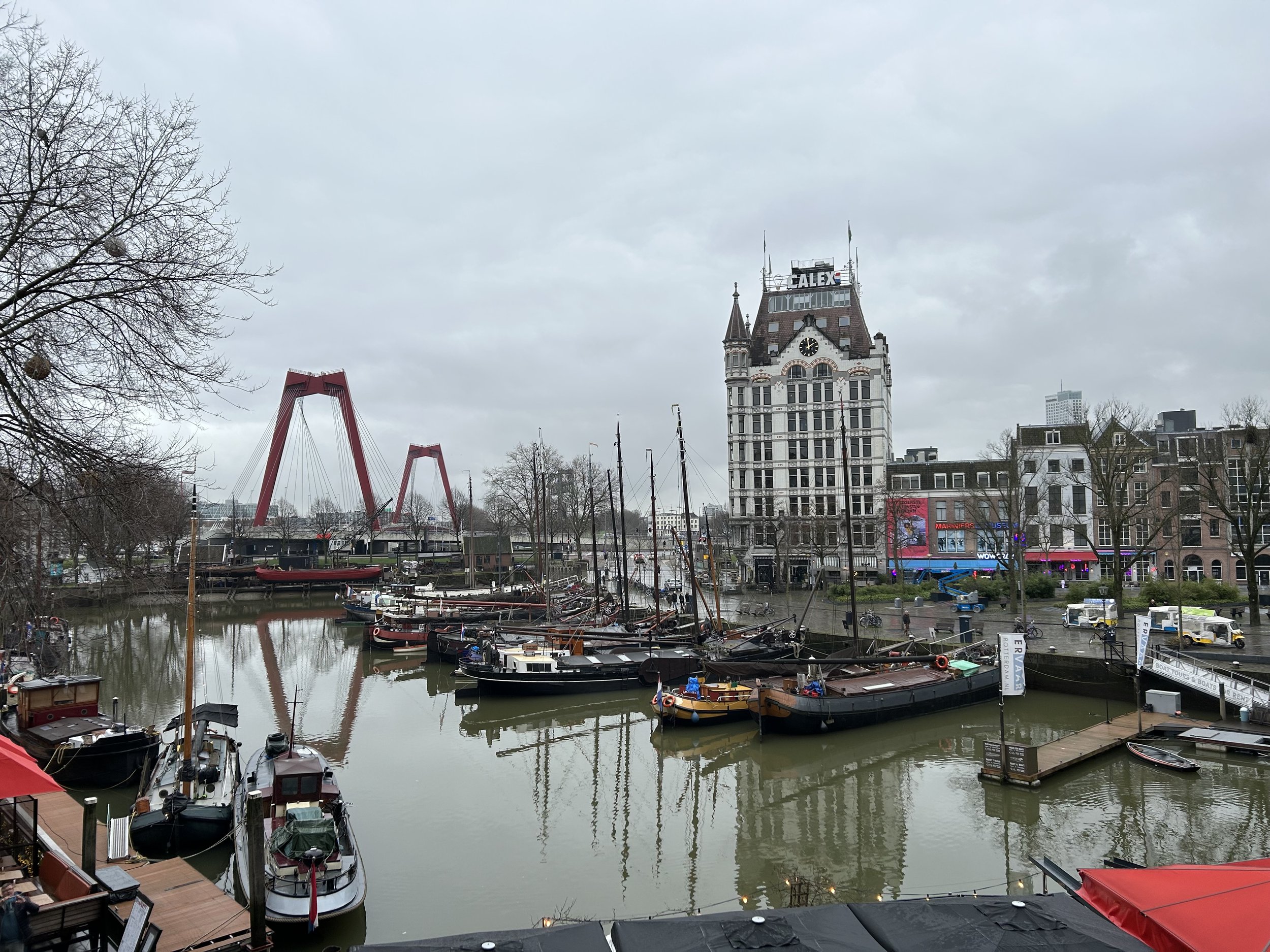
SDARL International Seminar Blog
Class XI International Study Seminar
“Innovation and Globalization in Agriculture”
Feb. 1-14, 2023 | Germany, Belgium, and the Netherlands
-

Last Day... Class XI Visits Supermarket of the Future and Winery
Feb. 13, 2023
A niche farm, a supermarket, and a winery tour…what a way to end an amazing trip! SDARL Class XI ended our international seminar in Europe on Monday with a few final tours and a wonderful supper celebrating our tour guide, Mathilde.
We started at the Bauernladen Hof Erbenheim Farm, where one of the owners, Michael, showed us his apple orchard, small greenhouses, and his shop. They transitioned their farm from a ‘traditional’ farm in the 1980s when it became clear that the farm wouldn’t survive against the production of larger operations. Today, they grow fruits and vegetables and sell them locally along with supplying them to preschools and elementary schools in the local area. Where there’s a will to keep a farm operational, there’s a way!
We then traveled to a local supermarket that Michael’s farm supplies fruit and vegetables to during certain parts of the year. This supermarket also has a greenhouse on the roof – we didn’t get to tour that, but it is an interesting concept for a grocery store. What a great way to use a giant roof!
Our final tour was at a winery, where we heard from the 7th-generation wine maker. She went to school for winemaking and has since took it over from her father. She shared that Germany had over 100,000 hectares of vineyards for the winery industry in the country and the area they are in is one of the best (which we can confirm…the wine was delicious).
We ended the night with a supper to celebrate and thank our wonderful tour guide, Mathilde. She shared so much information with us during our two weeks in Europe and somehow kept 30 Americans on track and in line.
Today (Tuesday) is travel day – a few of our classmates headed off to explore more of Europe with their spouse or a friend and the rest of the group flew home. What an amazing 14 days for SDARL Class XI – with memories and lessons that will last a lifetime.
-

Aachen, Germany; Urban Farm; Lignite Mine
Feb. 12, 2023
To start the day on Sunday, February 12, a few members of SDARL Class XI attended Catholic Mass at one of the oldest cathedrals in Europe in Aachen, Germany. This cathedral was Emperor Charlemagne’s own Palatine Chapel and was constructed between 793 and 813. After the service, they joined the rest of the class for a walking tour of the city of Aachen led by a local tour guide.
The city’s name, Aachen, means water in all languages even though there’s no river or sea in the city. Natural hot springs provide water and baths for local people to this day. It was known for needle factories previously but now is home to all things sweet, with a Lindt chocolate plant, and a local favorite, Printen cookies, being produced there. The history of Aachen runs deep, as Emperor Charlemagne wanted to rebuild a Roman city in Aachen and it still is considered the most French city in Germany.
After our walking tour of Aachen, we jumped on the bus for a trip to have lunch at an urban farm getaway at Millianshof of Family Modder. We dined on traditional German food (spaetzle) and a few in our group even fed the chickens. Then it was time for a bus tour through the Rhenish Lignite Mining Region led by David, a local farmer/tour guide. This area of Germany is known for its great soils and boasts top yields in the country. It is also home to coal power stations, so we stopped at the coal mine to see that. Although coal is big business in the area, Germany (like many other countries) is working toward renewable energy, so this area may change in the next few years as they work toward reaching their sustainability goals.
After the mining bus tour, we headed to Mainz, Germany for the night, where we will spend the remainder of our trip.
-

Chicory and Churches
Feb. 11, 2023
Morning Tour – Praktijkpunt Landbouw Vlaams-Brabant (Agricultural Practice Center and Research Institute), located in Herent, Belgium is famous for its chicory consulting, growing ,and research, along with arable farming of grains, rapeseed, and innovative crops. Their extensive research sources includes:
University Fundamentals
Applied Governmental Research
Applied Research Grants
Additionally, they provide 20,000 boxes of Chicory for educational purposes to educate the younger generation.
It is noteworthy that Belgium exports its chicory to over 40 different countries. Grown in the absence of light the chicory remains white to pale in color, is crisp and has a bittersweet flavor. SDARL members who tasted it for lunch had mixed reactions, due to the flavor and texture. The bitter inner part of the stem is typically cut out and the tender chicory leaves are served in salads, stir fry and soups or braised, roasted or grilled.
The Research Institute is focusing on crops and seeds like soybeans, chickpeas, pumpkin, mustard, and camolina, to name a few. Additional innovation and research includes hydroponics, varietal selection, insect control along with testing different plant varieties. Other areas of research includes insecticides, nature control methods and heavy focus on Leaf Minor Flies. SDARL members enjoyed the tour and were thoroughly impressed with the fact that the tour guide, Else, researched the state of South Dakota and presented us with facts that she learned.
AFTERNOON TOUR – WALKING TOUR OF LIMBURG WITH MATHILDE
Experienced Tour Guide Mathilde conducted an unbelievable tour of Limburg utilizing Whispers audio system, so SDARL members could clearly hear her wealth of knowledge of the area. Limburg is Netherlands capital and the oldest town of the Netherlands, with an international flair brought together from students, tourists and an active nightlife. Limburg has many sights to see including museums, astonishing architectural structures – breath taking churches, restaurants, shopping stores, along with nature walks. What were some of the unbelievable sights that SDARL class members experienced: Venlo, Valkenburg aan de Geul along with breathtaking churches in Maastricht including churches located in the Vrijthof Square.
-

Belgium: Aquaponic Farm, Fish Farm, and Chocolate
Feb. 10, 2023
We started the day’s adventure by touring the BIGH Urban Farm in the Brussels Aquaponic Farm, built in the heart of Brussels in the Canal Priority on the roof of the Foodmet (a food market designed by ORG architects, on the historic site of the Abattoirs in Anderlecht). Their organizational goal is to build a network of urban farming in major cities around the world. It was noted that it took just over a year to develop the Brussels Aquaponics Farm with work beginning in 2017 with the first gardening trials being carried out in 2016, with the greenhouse and fish farm being completed in 2018.
Striving to achieve technical synergies, the fish farm is the only one in Brussels and strives to produce 23 tons of rainbow trout a year. The Urban Farm provides circulating well water with a stable temperature to promote growth and is rich with nutrients and helps fertilize their hydro-pic systems as well as the outdoor garden. Their good fish farming practices includes:
Taking care of micro-organisms so they don’t tolerate chemicals or antibiotics and utilizes specialized organic feeds and specific light levels.
Outdoor gardens planting and harvesting vegetables.
Practicing good habits: zero chemicals and antibiotics saving billions of microorganisms.
Fish food: fish and plant-based pellets, certified sustainable and without GMO’s, treatment control of water, light levels and food security, fish sorting systems, and improving animal welfare.
SDARL Class XI toured a BIGH, a huge greenhouse of aquaponics in Brussels producing herbs, tomatoes and other vegetables in in three horticultural areas over 2150 sq. ft. This greenhouse is naturally pollinated by bumble bees. Biological pest control methods are used to manage possible diseases. They don’t use any chemicals or pesticides. They also have a 7500 sq ft. roof top outdoor garden that started in 2016 and has grown to almost 22,000 sq ft. of cultivation today. They are extremely proud to be the largest productive rooftop garden in Europe today. Brussels is at the forefront of new agricultural techniques on the rooftops and truly want to achieve economic viability.
AFTERNOON TOUR – CONCEPT CHOCOLATE – CERTIFIED BELGIAN CRAFTSMANSHIP – BRUSSELS
Filled with enthusiasm and energy Concept Chocolate Speaker – Steffen stated that since its creation in 1986, the chocolate factory Concept Chocolate is renowned for its high quality Belgian Artisanal Chocolate. They receive 16,000 visits per year to their factory. They have six employees who harvest the cocoa plants by hand. They harvest and process them twice a year. Leading exporters of Chocolate include Belgium and Switzerland. The Top Domestic Consumption comes from Switzerland, Belgium and Ireland with the USA coming in 15th.
Confectionery consumption leaders are Germany, Switzerland and the United Kingdom.
The Processing includes:
Step 1 – Cocoa Beans – Cleaning, fermenting, shelling, roasting and winnowing.
Step 2 – Roasted Nibs – Grinding and Refining.
Step 3 – Mass/Liquor – Pressing – Into cocoa cake for cocoa powder or cocoa butter or mixing, grinding and conching into dark, milk or white chocolate.
SDARL Class XI members were provided with their choice of these fresh chocolate treats.
-

Impressive Potato Farming in the Netherlands
Feb. 8 and 9, 2023
On February 9th SDARL Class XI was joined by the USDA Foreign Ag Service. Hearing how they work with the European Union (which has 27 member countries) was fascinating. It was reiterated that European farmers are a lot like American farmers and have a lot in common, the biggest difference is the increased regulation and mandates European farmers have to deal with. Much of this is due to the European Green Deal. FAS works on our behalf to promote and build trust in American ag, point out issues in proposed legislation, work with trade, and many other things. The EU legislative process is different than in the US and was fascinating to learn about.
Next up we met with Copa-Cogeca. Copa (representing European farmers) & Cogeca (European Ag Cooperative) started as separate organizations in the late 1950’s and then joined forces in 1962. The members of Copa-Cogeca are commodity groups and ag organizations. Think of it for example if say Farm Bureau and Farmers Union merged together and had other commodity groups as their members and were a unified voice for agriculture. They have a lot of clout because of representing so many groups. It also creates a unique balancing act because there are a lot of different viewpoints! Trying to create a positive message and have the farmers tell their story is a big focus right now.
On to the next! We had an opportunity to explore Brussels and the city Square on our own in the afternoon. SDARL CLASS XI HAD AN AMAZING DAY 8 ON THEIR INTERNATIONAL SEMINAR TOUR!
Starting our day in Nijmegen, Netherlands with Barenburg, a family owned global seed company, specializing in grass for forage and turf. The company started in 1904 with the ideal to always put people first because people make the difference. They have 900 employees and are operating on 6 continents including the US. Research and development is extremely important to the company to stay relevant and provide the quality grasses they’re known for. Our tour of the labs, warehouse, and seed processing was really amazing!
Up next we traveled to Jacob Van den Borne’s potato farm on the Netherlands/Belgium border. What an amazing and knowledgeable guy! He’s so much more than just a potato farmer. He is using precision farming and taking it to the next level! Jacob works with 60 other farmers to grow potatoes on 180 fields a year in rotation with other crops, growing potatoes only 1 out of 4 years. Precision applying everything and collecting and analyzing data on everything in production, utilizing an app specially built for his farm. He’s a McDonald’s Flagship Farm and sells about 10% of his potatoes to them as well. All waste products are reused on his farm. Check him out on YouTube or any social media platform to learn more!
We capped off the day with a wonderful meal at the Chez Leon restaurant. What a great day!
-

European Ag Equipment and New Technology
Feb. 7, 2023
SDARL Class XI International Seminar, the day started with a drive to Alpen, Germany, where we visited the headquarters and factory of Lemken Equipment. Lemken got its start in 1780 making plows. They say they are the oldest equipment manufacturer in the world, and can prove that 1804 was when the first Lemken plow was constructed.
Lemken got its start making plows, but now has a full lineup of tillage and seeding equipment. They make a twin row off-set planter that they call their Delta Row Planter. They claim it can raise yields 5% by allowing 70% more room to grow.
Lemken has 2,000 employees, had 446 million euros of revenue in 2021, has two factories, and exports 81% of their equipment. Lemken is the fifth largest equipment brand in Germany, based on sales.
Our second stop for the day was in Oirlo, Netherlands, where we toured the facility of AgXeed. They manufacture autonomous machinery for all agricultural applications. Their slogan is “We provide autonomy.”
The employees of AgXeed have come from other manufacturers like John Deere, Claas, CNH, and Lemken. They didn’t like the direction the major tractor manufacturers were going with larger autonomous tractors, so they went out on their own.
AgXeed believes they can lower costs of farm production, apply robotic precision, and eliminate soil compaction through the use of lighter weight autonomous tractors. They believe farmers will see 60-80% savings in labor, 10-20% lower fuel consumption, reduce operating costs by 5-20%, and increase yields 10-40% through the use of autonomous equipment.
-

SDARL Class XI Heads to Germany
Feb. 6, 2023
Today, Feb. 6, the SDARL Class XI checked out of the hotel in Utrecht, NL and were on the road by 8:00.
Our first stop of the day was in Emsburen, Germany where we visited Emsflower, a green house covering approximately 150 acres. Emsflower is Europes plant production under glass. They grow three different types of tomatoes many different flowers, and are experimenting with growing lettuce in a high tech hydroponic system.
Their current building has been in use for the past twenty years. They use robotics to plant approximately 500,000,000 plant seedlings a year. They also utilize autonomous trolleys to move the planted seedlings around the greenhouse. Our class was very impressed with this greenhouses use of technology.
Our second stop for the day was at Saer Bioenergiepark in Saer beck Germany. The community has over the years become energy self-sufficient by utilizing a combination of solar energy, windmills, and running a composting and biogas plants. The community started out putting solar panels on the south facing roofs of the buildings in town. They then added windmills. The residents sort their bio-trash separately, which is composted. The methane is captured and stored with the methane from the bio gas plant, which is fueled by area corn stalls and animal manure.
When the wind isn’t moving their windmill and when the sun isn’t hitting the solar panels, that’s when they burn the renewable gas that they have stored to power their electrical generators. The community is now producing four times the electricity that they need. This has all been accomplished with local investors and bank loans. No government grants or funds were used.
-

Floating Farm, Rotterdam, and Amsterdam
Feb. 4 and 5, 2023
South Dakota Leadership SDARL Class XI International Seminar took the class to a floating dairy barn, Rotterdam, and Amsterdam.
Day 5 – February 5th
Class XI ventured into Amsterdam, NL for the day. The first stop allowed the class to view a privately owned old Dutch windmill that is a family residence. The next stop led the class to a wonderful tour of Amsterdam’s Grachten (Canals). The afternoon was spent exploring locations such as the Anne Frank Museum. The class headed back to Utrecht for the evening.
Day 4 – February 4th
Today, class XI made the 70km trip from Utrecht, NL to Rotterdam, NL. The day started with a private bus tour of the largest port in Europe, Rotterdam Harbor. The tour guide, Mr. Piet de Winter did a great job explaining both the history and future plans for the harbor. The tour went through shipping container yards, imported vehicle yards and by many oil refineries. The final stop on the tour was a beautiful view of where the harbor connects to the North Sea.
The class was able to split up in smaller groups for lunch at the Market Hall. The Market Hall provided authentic food selections from around the World. Before departing the Market Hall area, the class took a walking tour of an architectural phenomenon, Cube houses.
The last stop of the day was at the world’s first floating farm. The floating farm is a 40 cow dairy. The milking and much of the manure management is completed by robots. The class was intrigued to learn about how the city and the floating farm work together. The city provides the farm with part of the feed ration needed and the farm in turn gives the city milk and cheese for the food banks.
The class wrapped up the day back in Utrecht with a great meal.
-

You Gouda See This!
Feb. 3, 2023
Today was our first full day on our international journey. We spent the night in Utrecht, Netherlands. We boarded a bus and began our day with a tour of Wageningen University, a local agricultural research college. We walked through Unifarm and NPEC greenhouse and research center where they focus on plant research on the molecular level. They heavily study all kinds of different environments that can change the makeup of plants. The group enjoyed a meal at the university union center surrounded by local students.
We re-boarded the bus and traveled to Gouda, Netherlands where we took a walking tour of the town and enjoyed the local culture and people, while learning about one of the oldest cities in the Netherlands. After a few hours of free time to explore and adventure on our own we reconvened on the bus and made the trip back to our hotel ending our 3rd day.
-

And We're Off!
Feb. 1 and 2, 2023
The SDARL Class XI “Innovationa and Globalization in Agriculture” International Study Seminar to Germany, Belgium, and the Netherlands begins!
February 1st was a big travel day for all SDARL classmates. Three different groups flew out of the Sioux Falls, Aberdeen and Rapid City airports, all meeting up in Minneapolis ready to board our 8-hour international flight.
Day 2: With a 7-hour time change added to our late-night first day flight, most members arrived in Amsterdam around 12:30 pm local time. We quickly gathered our bags and boarded a tour bus and headed straight to our first farm tour of a local potato and onion farmer. Farm of Mr. Peter Hilgers on the Dutch polder, a piece of low-lying land reclaimed from the sea or a river and protected by dikes. He discussed local government and social farm issues and struggles of European farmers. Many of his issues are also issues we deal with globally. We finished our short day checking into our hotel and meeting back up at a local eatery, Humphreys, having a great meal and social.
Class XI Interational Seminar Photo Gallery
SDARL International Study Seminars
Class I
Class II
Class III
Class IV
Class V
Class VI
Australia (2004)
United Kingdom | Belgium | Netherlands (2006)
Brazil | Argentina (2008)
China (2008)
South Africa (2010)
China (2012)
Class VII
Class VIII
Class IX
Class X
Class XI
Chile | Peru (2014)
Portugal | Spain (2016)
India (2018)
Vietnam (2020)
Germany | Blegium | Netherlands (2023)
